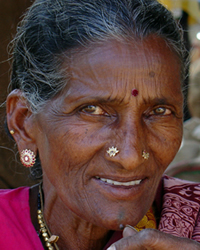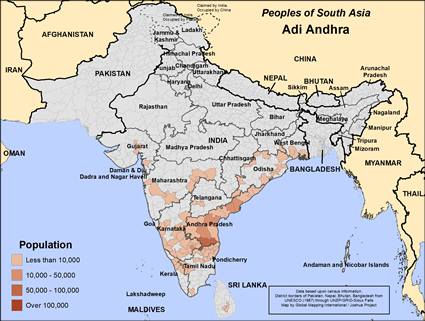Adi Andhra in India

Photo Source:
Copyrighted © 2026
Anonymous All rights reserved. Used with permission |

Map Source:
People Group data: Omid. Map geography: UNESCO / GMI. Map Design: Joshua Project
|
| People Name: | Adi Andhra |
| Country: | India |
| 10/40 Window: | Yes |
| Population: | 310,000 |
| World Population: | 310,800 |
| Primary Language: | Telugu |
| Primary Religion: | Hinduism |
| Christian Adherents: | 0.85 % |
| Evangelicals: | 0.43 % |
| Scripture: | Complete Bible |
| Ministry Resources: | Yes |
| Jesus Film: | Yes |
| Audio Recordings: | Yes |
| People Cluster: | South Asia Dalit - other |
| Affinity Bloc: | South Asian Peoples |
| Progress Level: |
|
Introduction / History
The first part of their name means "original." Thus, they are seen as the original people of Andhra Pradesh. Some also live in the nearby states of Tamil Nadu and Karnataka. The main language of the Adi Andhra is Telegu.
The Adi Andhra are a Scheduled caste of people living in south India. A Scheduled caste means that they are disadvantaged and victims of past discrimination. The Indian government provides guaranteed places in education and public jobs for them.
Beginning in the 20th century the Adi Andhra and other lower caste peoples started a reform movement to gain human rights and economic opportunities. The movement continues today. A small group of Adi Andhra has gained an education and become professionals. Some Adi Andhra have moved to cities to work in industry, improve their status and have their children attend school.
What Are Their Lives Like?
Today most Adi Andhra are still landless, rural farm workers. Some also work as street sweepers, village watchmen and in the leather trade. Some women work as domestics.
The lives of the rural Adi Andhra are very challenging even by Indian standards. Often they are without electricity, access to clean water, indoor plumbing and modern medical care. They work in the fields from sunup to sunset with little hope for a better life. Their children must work in the fields to help support the family.
The Adi Andhra are endogamous, that is they marry within their clan. Young people frequently marry their cousins. Families arrange the marriages. Sons inherit what little property they own.
Unlike most Hindus, the Adi Andhra will eat any type of meat they can obtain. The major portion of their diet is rice and any vegetables and fruit they can afford. Meat is a luxury reserved for special occasions.
What Are Their Beliefs?
A few Adi Andhra are Buddhists, Sikhs or Christians but the vast majority are Hindu. The Adi Andhra give attention to the Hindu goddesses who they believe can protect them from epidemics, evil spirits and famine. The Adi Andhra participate in the yearly Hindu holidays of Holi, the festival of colors, Diwali, the festival of lights and Navratri, the nine-day celebration of autumn.
What Are Their Needs?
They need help with their physical needs such as clean water and a regular source of healthy food. They need new business and educational opportunities so they can break out of their lives of poverty and hardship. The Adi Andhra need to hear the life-changing gospel of Jesus Christ in the way they can understand.
Prayer Points
Pray the Lord sends Christian teachers, businesspersons and medical personnel to help the spiritual and physical needs of the Adi Andhra.
Pray the Adi Andhra see the love of Christ in the lives of those Christian workers.
Pray that God provides training for the Christian Adi Andhra and that they share the good news of Christ with their brothers and sisters.